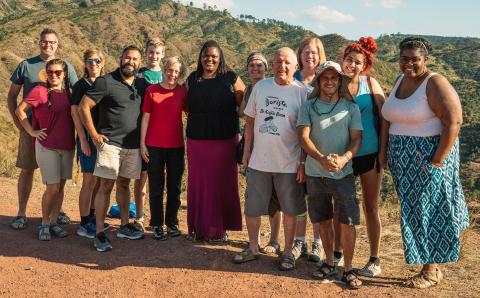For the first time in its 163-year history, the Christian Reformed Church canceled its annual synod due to the COVID-19 pandemic.
Normally synod lasts a week, each day including enthusiastic worship; times of camaraderie, in committees and over meals; and times of prayer.
But little is normal in this pandemic. Instead of a rousing synod with almost 200 delegates and all its ups and downs, the Council of Delegates met over four half-days, looking at each others’ faces in boxes on a screen. It met on behalf of Synod 2020 to conduct the business of the church that was ruled unable to wait until Synod 2021 meets a year from now.
It was a meeting marked by celebration, lament and mourning, a business-like atmosphere, but most of all by the oddness of it all.
An Odd and Strange Experience
As president of the Council, Paul De Vries, synod veteran from Classis Thornapple Valley, chaired the meeting. It felt odd, he said, because it has never happened before and there was no plan or precedent to follow.
William Koopmans missed the celebratory aspects that are part of synod: the celebration of new candidates for ministry, commemorating the services of pastors who are retiring (30 this year), and launching a significant vision for the ministry of the denomination with Our Journey 2025. Koopmans is the Council delegate from Classis Hamilton who has been to 17 synods, serving three times as president.
To recognize the candidates, Council made the best of it, having an on-screen ceremony that included a modified laying on of hands.
“Though meeting by Zoom in a special session is not nearly as personal, the disadvantages were mitigated in part by the fact that the (Council) members already know each other quite well,” said Koopmans. “The conversations were typically direct and gracious.”
Not a Rubber Stamp
For much of the meeting, the Council was approving aspects of its own work that would ordinarily be presented to synod. But that didn’t mean it all passed easily.
Roger Sparks, delegate from Classis Minnkota and also a synod veteran, said delegates were conscious of the dynamic of not being synod. “We were careful not to rubber-stamp previous (Council) decisions,” he said. “We discussed and carefully weighed each item of business, taking into consideration overtures and communications that we received from classes and individuals in response to previous (Council) actions.”
A case in point was the plan for recognizing the 25th anniversary of the ordination of women in the CRC. The plan was initially proposed back in February and recommended by the Council to Synod 2020. However, the plan was scaled down significantly when Council was acting on behalf of Synod 2020. Delegate Michelle Kool, from Classis Alberta North, said to be sensitive to people who hold a different biblical interpretation of the role of women, “in the spirit of love, unity, mutual submission and cooperation, we have limited the celebrating opportunities to a smaller ‘official’ time frame.”
De Vries said changing the Council’s own proposal isn’t as strange as it might seem. “When synod meets, it almost always tweaks and adjusts the recommendations of the Council of Delegates,” he said. He said that is how the system is supposed to work, whether synod meets or not.
Sheila Holmes, Classis Hackensack, yet another synod veteran, was not in favor of some of the actions the Council took. “There were things I felt the church needed to hear from a much broader voice than the (Council),” she said.
Ministry Shares
The Council approved immediate implementation of the Reimagining Ministry Shares program that will see churches pledging support for shared denominational ministries instead of being assessed a specific ministry share amount per member after denominational budgets are already created. Although it was adopted in principle by Synod 2019, several delegates advised holding off for a year, noting many classis meetings (regional groups of churches) that would have considered the report were canceled due to COVID-19.
Governance
The Council decided to continue moving ahead with restructuring the governance of the CRC along U.S. and Canadian lines, despite a protest from two Ontario churches. “It certainly would have been good to have synod speak into the vexing and complicated process of restructuring,” De Vries said. “But that wasn't to be this year.”
The Council also continued the work of previous synods in identifying and preventing abuse of power by leaders. It approved a mandatory training program for all those entering vocational ministry in the CRC, candidates, pastors from other denominations, and commissioned pastors.
Holmes felt the Council overstepped its boundaries in including commissioned pastors, noting that commissioned pastors are in the purview of classes.
Other Matters
The Council confirmed the appointment of Colin Watson as interim executive director for the coming year. Watson was appointed acting executive director after the abrupt resignation of former executive director Steven Timmermans. Timmermans was granted emeritation as executive director.
The Council approved Back To God Ministries International’s request to change its name to ReFrame Ministries: God’s Story, Today’s Media.
Struggling with Racism
The struggle with racism going on all over North America and around the world also came to the Council. Delegates took part in a time of lament over what is happening, hearing challenging words from two delegates who are black. “It’s time to lament, repent, and repair,” said Emmett Harrison. “If we only mourn, we go nowhere,” said Sheila Holmes.
Several CRC leaders had issued a statement online June 4. The Council issued its own resolution, but only after fractious debate.
Hoping for a Return to Normal Synods
All the delegates who spoke with The Banner are hoping for a return to normal synods.
Sparks said it is much better to meet in person with four-person delegations from each classis. “The fellowship and conversations among delegates at ‘normal’ synods are important for bridge-building between agencies/ministries and the classes of the CRC,” he said.
Koopmans said the special meeting of the Council went very well. “But I dare say it left most of us longing for a return to the broader and more public venue of business as usual at synod!”
About the Author
Gayla Postma retired as news editor for The Banner in 2020.








